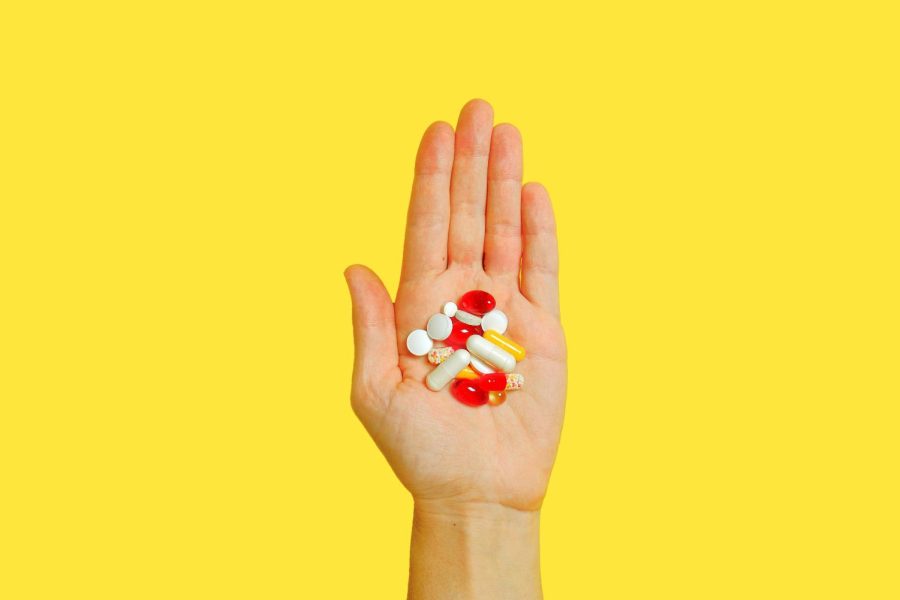Hibben: The Sketchy World of Supplements
May 22, 2022
We all want to be our happiest and healthiest selves. For those of us who don’t always eat the way we should, supplements and vitamins seem like a quick, easy fix for a lack of vegetables or protein. Especially as busy college students, who don’t always have the time, money or access to highly nutritious meals, a multivitamin seems an attractive option.
Americans spend $35 billion a year on these supplements. However, the booming industry is highly unregulated, and many companies produce misleading advertisements and misinformation. Some of these companies, for instance, capitalized on the COVID-19 pandemic. They promised that their supplements could cure an infection or protect you from even getting sick at all.
Because the supplement and vitamin industry remains insufficiently regulated by the FDA, we should consume with caution. Look out for phony quick fixes and cure-alls, as most things that sound too good to be true, are.
FDA regulation
The FDA does not properly regulate the supplement and vitamin industry. It doesn’t require any sort of trials for these products, allowing companies to sell their products without safety testing. In regards to marketing, the FDA can only take action against a company after a product reaches the shelves. Even then, penalization typically occurs on the basis of improper advertising.
The FDA has come under fire for its hands-off approach to the regulation of drugs and supplements. People have questioned the overall safety of the products the FDA approves, as well as the scarce scientific evidence behind many companies’ claims about their products. Consumers should challenge the credibility of substances they ingest.
COVID-19 Misinformation
The demand for vitamins and supplements spiked by over 50% in March of 2020 when the COVID-19 pandemic began. Even while scientific evidence was lacking, people flocked to buy products that claimed to boost their immune systems.
Many companies jumped at the chance to take advantage of peoples’ fear and lack of knowledge in their advertising. The FDA sent hundreds of warning letters out to companies who claimed their products could prevent or cure COVID-19.
We don’t know what effect those letters had on companies. NOW, a major supplement and essential oil company didn’t receive a letter. Their website says “NOW® adheres to GMP program standards as well as standards that, in many cases, go well beyond what’s required by the FDA,” even though consumers can’t view the evidence for themselves.
The Problem with Unregulated Health Products
We cannot sell dangerous over-the-counter health products to vulnerable consumers. Without regulation, we have no way of knowing which products are safe.
As of 2017, supplements were sending 23,000 people to the emergency room every year. Ephedra, marketed as a supplement energy booster and appetite suppressant, killed 155 people. The FDA did not ban the product until after the Olympics and college athletics did. Taking too much vitamin D, vitamin A and iron can induce serious symptoms, unbeknownst to many. Supplements could interact negatively with prescribed medications, and their labels don’t tell you how many ingredients might exist within them. Withholding possible safety risks from consumers is both unfair and unethical.
If advertising is not regulated until the FDA intervenes after the fact, companies can get away with misleading consumers. Misrepresenting the safety and effectiveness of their products denies consumers the ability to make informed decisions. Companies’ claims aren’t required to get approval from independent researchers, meaning that companies can produce deceptive research themselves. For example, doTERRA, the major essential oil brand, tells consumers to ingest essential oils. The science behind essential oils is untested and relatively new, and we haven’t conducted thorough research on the effects of smelling these oils. doTERRA is one of the many companies in the healthcare industry that continue to make dangerous, untested claims without any pushback. It’s foolish to trust companies to put your health and safety over their own profits, especially when billions are on the line.
Research shows that consuming vitamins and minerals through food is still your best chance at proper nutrition. So, maybe we shouldn’t rely so heavily on artificial substances in the first place. While the science behind these products is often murky, you can count on eating a proper diet and consulting your doctor. It’s a mistake to allow companies to govern their own standards for safety and fair advertising, and Americans shouldn’t risk becoming guinea pigs.









John Hedberg • May 22, 2022 at 9:27 pm
This article makes abundant good points that I recognize from taking NUIP 1020 a few semesters ago, which is the basic nutrition class, and it was THE best class I’ve taken so far at this university, the information was that pertinent and relevant.
Regarding supplements, NUIP 1020 recommended looking for the USP seal on the container, if you find you the temporary need to use supplements, since USP does quality testing which the Nutrition textbook found worth remarking about.
http://www.uspverified.com
Generally speaking, it’s better to get your dietary needs from fresh, whole foods, as Aya indicated. I recommend NUIP 1020, as well.
Best,
J Hedberg